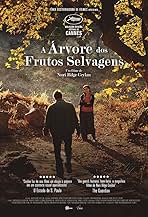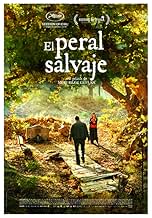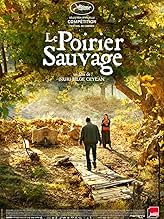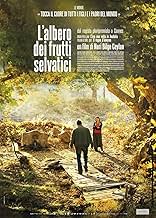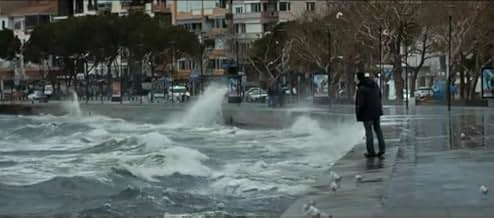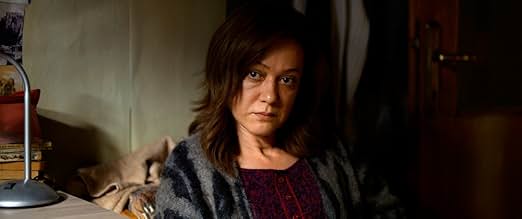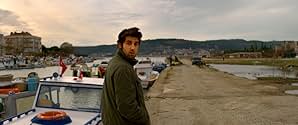Un escritor sin publicaciones regresa a su ciudad natal después de graduarse, ahí busca patrocinadores para publicar su libro mientras trata con el deterioro de su padre.Un escritor sin publicaciones regresa a su ciudad natal después de graduarse, ahí busca patrocinadores para publicar su libro mientras trata con el deterioro de su padre.Un escritor sin publicaciones regresa a su ciudad natal después de graduarse, ahí busca patrocinadores para publicar su libro mientras trata con el deterioro de su padre.
- Dirección
- Guionistas
- Elenco
- Premios
- 10 premios ganados y 15 nominaciones en total
- Sinan Karasu
- (as Aydin Doğu Demirkol)
- Yasemin Karasu
- (as Asena Keskinci)
- Dirección
- Guionistas
- Todo el elenco y el equipo
- Producción, taquilla y más en IMDbPro
Opiniones destacadas
Long because it's, well, long (clocking in at just over three hours). But also long because the main character, who's in virtually every frame of the movie, is such an unpleasant person to hang out with. And part of the reason that he's so unpleasant is that he's recognizable, as I've been that person myself. He's young, fresh out of college, and thinks he knows everything there is to know about life despite having almost no experience of it himself. He's cocky, condescending, and unbearable. What ultimately makes him worth spending time with, and for that matter makes the whole movie worth sticking with, is the final scene, in which he comes to understand that the father who he's shunned because of all the life mistakes he's so determined not to make himself is perhaps the one person in his life who most understands him and most emulates the ideals the son goes around shoving down everyone's throat.
This is the kind of movie I wish I had seen with someone else so I could have someone to talk about it with. Throughout the film, the protagonist has little moments of.....I'm not sure what to call them.....daydreams? hallucinations? A scene will play out one way, and the it will abruptly shift gears and play out another, leading us to believe that the first version was in the protagonist's head. I'm not sure what to make of these breaks from reality. He's written a book that he's trying to get published, so maybe these episodes are a glimpse into how events play out in his book rather than how they did in reality? Or maybe it's the reverse. Maybe the movie we're watching is the book he wrote, and these moments are what actually happened. Or maybe it's neither and I'm overthinking. Maybe he's just a writer who is always attuned to alternative paths a person's narrative might take.
The ending didn't exactly make me feel like all of the three hours preceding it were necessarily worth it. I don't know why the movie had to be quite so long. But it did linger in my head and it's made the whole movie grow in stature for me when I think back on it. I don't know that I'd want to watch it again, but I'm glad I watched it once.
Grade: A
Sinan Karasu is a young man who returns to his city and to his non-functional family after graduating college. The prospects of a college graduate are not too many or too attractive: either to take a teacher's exam after which he will be assigned to teach at a primary school in a remote area of Turkey, or join the army or the police. His father, Idris, is a teacher, but also a betting addict, which got him into debts, and led the family to losing the property of their house and living at the edge of a precarious existence. Idris's ambition seems to be to return to his native village, where in weekends he digs a fountain on a hillside, with little hope of ever hitting water. Young Sinan is also a writer, he wrote a book inspired by the local people and culture, but the kind of non-commercial book that finds neither editor nor reader public. The gaps between his aspirations and realities, between his ambitions and the mediocrity around are huge, and the result is a permanent conflict with a world with which he tries to entertain dialogues, but which he also approaches with a sense of intellectual superiority without foundation in social realities.
Like many other good movies (or books or other works of art), 'Ahlat Agaci' can be viewed and understood at several levels. At the personal level, the film has complex characters that we discover and we get to know better and better as we advance in the viewing, with the help the excellent acting performances of actors such as Dogu Demirkol, Murat Cemcir and Bennu Yildirimlar . There is also a political and social layer that is never explicit, maybe in order to allow the film to be easily distributed in Turkey and thus be accessible to the local audience, which is probably very important for a director like Nuri Bilge Ceylan, but also because true creators know how to convey messages without transforming their works into manifestos. Finally, there is a philosophical layer, more or less related to the main story, but which raises interesting issues such as the compromises that a writer is bound to make to gain popularity and what are their limits, or the relationship between religion and its institutions and their relevance in social life. Ceylan knows to tell a story and to film beautifully, and attentive viewers will also benefit from short moments of surreal insertions that deserve not to be missed. The film is long but in rare moments it feels so (the scene of the conversation with the two imams is the only one in which I had the impression that the cutting of a few minutes would have been beneficial), and the spectators will be rewarded at the end with one of the most exciting film finales which I have seen lately. A movie to see.
¿Sabías que…?
- TriviaAccording to Nuri Bilge Ceylan, The Wild Pear Tree is about a son's unavoidable slide towards a fate resembling that of his father.
- Citas
Sinan Karasu: When we learn we are not so important why is our instinct to be hurt? Wouldn't it be better to treat it as a key moment of insight? We engender our own beliefs. Thus we need to believe in separation as much as in beauty and love, and to be prepared. Because rupture and separation in wait for everything beautiful. In which case, why not treat these tribulations as constructive disasters that help us pierce our own mysteries.
- ConexionesFeatures Umutsuzlar (1971)
- Bandas sonorasPassacaglia and Fugue in C minor, BWV 582
Composed by Johann Sebastian Bach
Performed by Leopold Stokowski
Selecciones populares
- How long is The Wild Pear Tree?Con tecnología de Alexa
Detalles
- Fecha de lanzamiento
- Países de origen
- Sitios oficiales
- Idioma
- También se conoce como
- The Wild Pear Tree
- Locaciones de filmación
- Yenice, Çanakkale, Turquía(location)
- Productoras
- Ver más créditos de la compañía en IMDbPro
Taquilla
- Total en EE. UU. y Canadá
- USD 34,014
- Fin de semana de estreno en EE. UU. y Canadá
- USD 4,923
- 3 feb 2019
- Total a nivel mundial
- USD 1,696,258
- Tiempo de ejecución3 horas 8 minutos
- Color
- Mezcla de sonido
- Relación de aspecto
- 2.39 : 1
Contribuir a esta página



